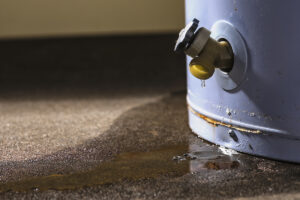
There are some common causes of water heater leaks that homeowners should be aware of, and we also have advice on how to handle these issues.
Water heaters are essential appliances in our homes, providing hot water for everything from showers to cleaning dishes. However, over time, water heaters can develop issues, and one of the most concerning problems homeowners face is water heater leaks. A leaking water heater can lead to significant water damage, increased energy bills, and a disruption in your daily routine. Understanding the common causes of water heater leaks and how to address them can save you time, money, and frustration.
What Causes Water Heater Leaks?
What are the most common causes of water heater leaks and how can they be addressed? Let’s go over it!
Corroded Tank
The most frequent cause of a leaking water heater is a corroded tank. Over time, mineral deposits, especially in areas with hard water, can accumulate inside the tank, leading to rust. As rust builds up, it can weaken the tank’s structure, eventually causing cracks or holes to form, resulting in leaks.
How to Address It
Unfortunately, once the tank corrodes, it is often beyond repair. If you notice signs of corrosion, such as rust-colored water or visible rust on the tank, it may be time to replace the water heater entirely.
Loose or Damaged Connections
Water heaters have multiple pipes and connections, such as the inlet and outlet connections, the pressure relief valve, and the drain valve. These connections can become loose or damaged over time due to normal wear and tear, causing water to leak.
How to Address It
Inspect all connections and tighten any loose fittings. If the fittings appear cracked or damaged, replace them immediately. Always ensure the connections are properly sealed to avoid future leaks.
Faulty Temperature and Pressure Relief Valve (T&P Valve)
The temperature and pressure relief valve is a crucial safety feature of a water heater. It prevents the tank from over-pressurizing or overheating, which could lead to a dangerous situation. If the valve becomes faulty or fails, it may cause water to leak from the valve opening.
How to Address It
If you notice water leaking from the T&P valve, the valve may need to be replaced. You can try testing the valve by lifting the lever to release any trapped pressure and ensure it’s functioning properly. If the issue persists, call a professional plumber to replace the valve.
Sediment Buildup
Sediment buildup is common in water heaters, especially in areas with hard water. As minerals accumulate at the bottom of the tank, they can cause overheating and pressure issues. In some cases, this buildup can cause a leak by damaging the internal components of the water heater.
How to Address It
To prevent sediment buildup, it’s important to flush your water heater periodically. Flushing the tank removes the sediment and helps maintain its efficiency. Depending on your water quality, you may want to flush the tank every six months to a year.
Aging Water Heater
Like all appliances, water heaters have a lifespan. Most water heaters last between 10 to 15 years. As your water heater ages, its components can wear out, and leaks may become more frequent. Older models are also more susceptible to corrosion and pressure issues.
How to Address It
If your water heater is nearing the end of its lifespan, consider replacing it before a leak becomes a major problem. Regular maintenance can help extend the life of your water heater, but eventually, replacement may be necessary.
Call Mahon Plumbing Today
If you still have more questions regarding your plumbing, we here at Mahon Plumbing are here to help. We have been serving the wider Baltimore area since 1994, so we have 25 years of experience to back up our fantastic service! Call us at our Baltimore location at 410-766-8566 or our Pasadena location at 410-636-7944. Be sure to keep up with us on social media by following us on Facebook or Twitter.
